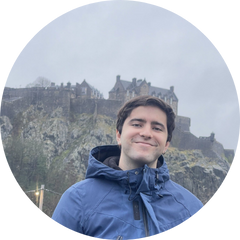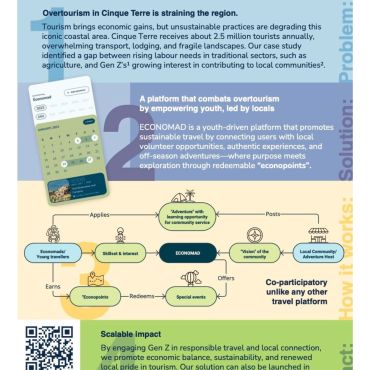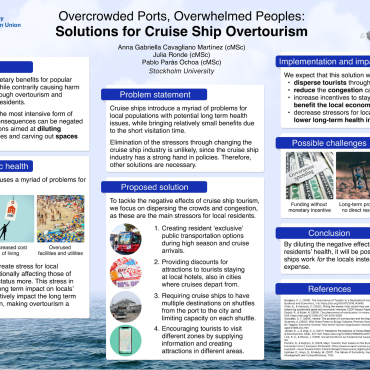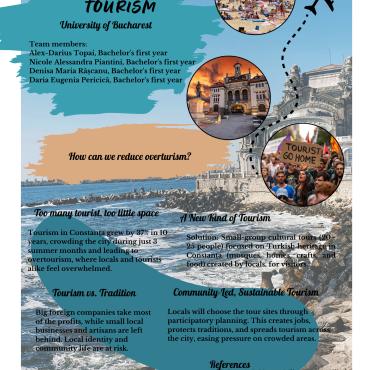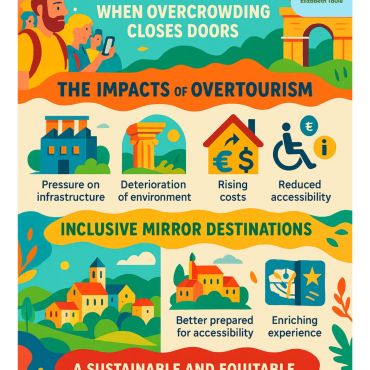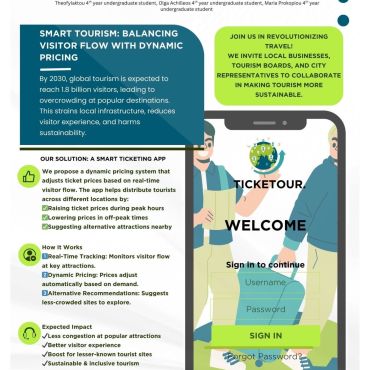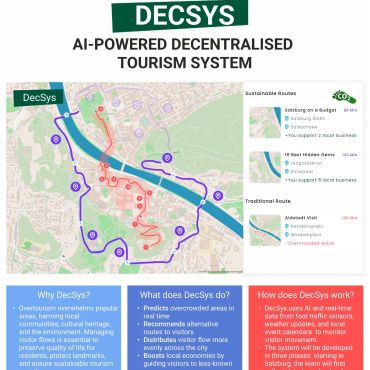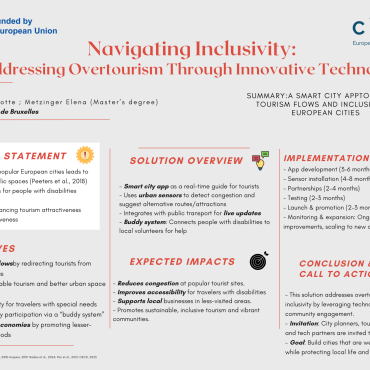Meet the Creathon Teams
Université libre de Bruxelles
Navigating Inclusivity: Addressing Overtourism Through Innovative Technology
The Team
- Lorane Demoulin, Master 2, Sciences and Management of Tourism
- Charlotte Lechat, Master 2, Sciences and Management of Tourism
- Elena Metzinger, Master 2, Sciences and Management of Tourism
The Idea
Our project addresses the growing challenge of overtourism in major European cities, where high visitor numbers lead to overcrowded public spaces and significant barriers for people with disabilities. This situation not only affects the quality of life for residents and visitors but also challenges the principles of accessible and inclusive tourism, a key priority for the European Union. We propose a smart city mobile application that manages tourist flows in real time, with a strong focus on inclusivity and sustainability. Using urban sensors, the app detects congestion and suggests alternative routes or lesser-known attractions, helping to distribute visitors and reduce pressure on popular sites. Integrated with public transport systems, it provides live updates on vehicle occupancy, enabling users to avoid crowded journeys. A central feature is the “buddy system,” connecting travelers with disabilities to local volunteers for personalized assistance and guidance on accessible routes and services. The implementation plan includes accessible app development, sensor installation, partnerships with local stakeholders, and a robust awareness campaign. The expected impact is reduced congestion at major sites, improved accessibility for all tourists, and increased support for local businesses in less-visited neighborhoods. Key challenges (privacy, infrastructure, user adoption, and funding) will be addressed through strong partnerships, transparent communication, and ongoing improvements.
Paris Lodron Universität Salzburg
DecSys: AI-Powered Decentralized Tourism System
The Team
- Cansu Demir, PhD Candidate in Artificial Intelligence and Human Interfaces, Human-Computer Interaction specialized in In-Vehicle Intelligent Agents in Automated Vehicles
- Aysenur Gürel,Master’s Student in Artificial Intelligence and Human Interfaces, Human-Computer Interaction specialized in Large Language Models for Interaction between Humans and Virtual Agents
- Yu Dong, PhD Candidate in Artificial Intelligence and Human Interfaces, Geoinformatics specialized in Earth Observation in Support of Environmental Policy Compliance.
The Idea
DecSys is a smart tourism project from the University of Salzburg that uses Artificial Intelligence (AI) to help manage overtourism in European cities. Overtourism happens when too many visitors crowd popular areas, causing problems for local people and the environment. DecSys offers a digital solution by guiding tourists to less crowded but still culturally interesting places. The system uses AI and real-time data to track visitor movement, predict busy areas, and suggest alternative routes. A mobile app provides personalized recommendations, using information from foot traffic sensors, weather updates, and local event calendars. These suggestions help spread visitors more evenly and improve their travel experience while protecting popular sites. DecSys will be developed in three phases. First, the team will collect data and understand local tourism patterns, starting in Salzburg. Then, they will build and test the AI system and mobile app with a small group of users. Finally, the system will be expanded to other cities and improved based on feedback and new data. The system also supports sustainable urban planning by working with local governments to identify underused areas and improve infrastructure. It contributes to several UN Sustainable Development Goals by reducing overcrowding, boosting local economies, and lowering environmental impact. Challenges like limited data, personalization issues, and privacy concerns will be handled using advanced AI techniques such as federated learning and diversity-aware recommendations. DecSys aims to create a smarter, fairer, and more sustainable way to travel—for both visitors and communities.
National and Kapodistrian University of Athens
Ticketour – Smart Tourism Through Dynamic Pricing
The Team
- Simona Achilleos, 4th year Undergraduate Dental Student
- Alexandros Antonopoulos, 4th year Undergraduate Dental Student
- Alexandros Theofylaktou, 4th year Undergraduate Computer Science Student
- Olga Achilleos, 4th year Undergraduate Medical Student
- Maria Prokopiou, 4th year Undergraduate Mathematics Student
The Idea
By 2030, global tourism is projected to reach 1.8 billion visitors, raising serious concerns around overtourism, especially at iconic cultural heritage sites. Overcrowding strains infrastructure, diminishes visitor satisfaction, and undermines the sustainability of tourism. Our proposed solution, ‘Ticketour’, is a smart tourism app that helps solve the problem of overtourism by using real-time data and dynamic pricing. Our system adjusts ticket prices at popular attractions depending on visitor density, encouraging tourists to explore less-crowded and lesser-known sites during off-peak hours. The app also provides alternative recommendations, route planning, and incentives for users who shift their visit patterns. Through this model, Ticketour aims to reduce congestion at iconic sites, improve visitor experience, and promote sustainability and inclusivity in tourism. Cities and tourism boards benefit from real-time data insights to make better decisions and manage flows more effectively. Ticketour is designed to be scalable and can be adapted for multiple cities across Europe and perhaps, the whole world. In our project, we have also assessed an implementation plan, the expected impact, possible challenges and risks and a business canvas that sums it up.
University of Bucharest
Towards slow tourism
The Team
- Alex-Darius Topai, Bachelor’s first year student
- Denisa Maria Rășcanu, Bachelor’s first year student
- Daria Eugenia Pericică, Bachelor’s first year student
The Idea
Constanța, Romania’s largest coastal city and a vibrant cultural hub, has experienced a significant rise in tourism over the past decade. While this growth has brought economic opportunities, it has also led to overtourism, especially during the summer months, putting pressure on infrastructure and diminishing the quality of life for locals. In response, our project proposes a more sustainable and inclusive approach that highlights Constanța’s unique Turkish heritage. The core idea is to design a cultural tour that goes beyond the usual tourist spots, offering small groups of 20–25 people the chance to discover lesser-known areas of the city through an immersive and meaningful experience. The tour will showcase both tangible elements—like mosques, traditional Turkish homes, and statues—as well as intangible heritage, such as local crafts, cuisine, and customs. By involving locals in selecting the tour sites through community surveys, the project fosters civic engagement and gives residents a voice in shaping tourism in their city.
University of Glasgow
A platform connecting young travellers
The Team
- Raya Ali Sajid, MSc Management and Sustainable Tourism
- Sofia Guerrero, MSc Sustainable Tourism and Global Challenges
- Waka Takamido, MSc Sustainable Tourism and Global Challenges
The Idea
Rural destinations like Italy’s Cinque Terre are grappling with overtourism: its five villages with a population of around 4,000 welcome double the region’s sustainable carrying capacity of 3,650 daily tourists. Affordable transport, social‑media appeal, and seasonal train congestion exacerbate socio-environmental stress, while locals face labour shortages in traditional sectors such as agriculture. Meanwhile, some Gen Z travellers prioritise sustainability and seek meaningful travel experiences. However, rising tourist taxes risk pricing out younger visitors, contravening UN SDG 8’s call for inclusive growth. This reflects a broader disconnect between the supply and demand of sustainable initiatives, thereby limiting the potential to address overtourism in a meaningful and inclusive manner. To bridge this gap, we propose a digital platform that matches socially conscious young travellers with community-led sustainability projects, such as vineyard volunteer work, land restoration, and village upkeep. The co-creation process engages residents and stakeholders to define carrying‑capacity thresholds, project priorities, and long-term visions. Expected socio-physical benefits include environmental preservation, inclusive tourism, and year-round economic stability; socio-psychological impacts encompass respectful cultural engagement, “high‑value, low‑impact” tourism, and youth education. By harnessing Gen Z’s eagerness to contribute, this platform aims to transform overtourism into a force for inclusive, sustainable growth, positioning Cinque Terre as a model for future destinations.
Stockholm University
Overcrowded Ports, Overwhelmed Peoples: Solutions for Cruise Ship Overtourism
The Team
- Anna Gabriella Cavagliano Martínez, MSc Student
- Pablo Parás Ochoa, MSc student
- Julia Ronde, MSc student
The idea
The cruise ship tourism industry is known as the most impactful for residents through issues like overcrowding and congestion. We propose to look at this industry through the lens of public health. We believe that the cruise ship industry has a long-term negative impact on quality of life, especially for those in lower socioeconomic brackets. Our proposed solution focuses on diluting the tourists throughout the city, carving out spaces for residents and incentivizing staying at local hotels. Our implementation plan consists of the following four parts:
- Creating ‘resident specific’ public transport cards
- Giving exclusive benefits to those staying in local hotels
- Demanding multiple stops from cruise ships’ shuttle buses
- Encouraging the dilution of tourists throughout the city by social media promotion
The expected impact of this plan is the reduction of over-crowding and thereby reducing the long-term negative impact on residents. The main challenge of the plan would be finding the funding to implement it while also maintaining said funding throughout the entire period this plan of action would take to generate results. Another potential challenge is going head-to-head with the cruise ship lobbying industry. We recognize tourism as a necessary economic force. To make the tourism industry sustainable for the local population changes must be made, especially in the cruise ship industry. With this proposal we urge governments to take action and invest in the health and well-being of their local population. It is possible to make cruise ships work for the locals instead of at their expense.
Universidad Autónoma de Madrid
Overtourism and Exclusion: When Overcrowding Closes Doors
The Team
- Marlena Casajuana, 3rd year, Tourism Degree
- Nur El-Madkouri, 3rd year Teaching Degree
- Elizabeth Taulé Bobadilla, 3rd year Tourism Degree
- Nuria Maciá Hernandez, (3rd year Tourism Degree
The Idea
The project “Overtourism and Exclusion: When Overcrowding Closes Doors” addresses the growing issue of mass tourism in Europe, which leads to overcrowding, strain on infrastructure, heritage deterioration, and exclusion of people with disabilities. While Europe remains a top tourist destination, excessive visitor numbers create significant barriers to inclusion, affecting over 16% of the global population living with disabilities. These individuals face physical, informational, and social obstacles that limit their right to leisure, culture, and mobility. Beyond social justice, exclusion represents a missed economic opportunity. Accessible tourism in Europe could generate up to €88.6 billion annually by 2030, as travelers with disabilities take as many trips as the general population and often travel with companions, amplifying their economic impact. A study across several European countries identified major barriers: inaccessible accommodations, transportation challenges, lack of accessible information, and untrained tourism staff. Those affected propose concrete solutions, including specialized tourism packages, mandatory staff training, and travel support programs. The core proposal is to develop “Inclusive Mirror Destinations”; alternative sites with similar cultural or natural appeal to overcrowded hotspots but less crowded and better equipped for accessibility. This model reduces pressure on popular areas while promoting inclusive and sustainable tourism. Implementation involves a five-step plan: identifying accessible mirror destinations, improving accessibility in busy areas, offering inclusive packages, training staff, and securing funding and monitoring. In conclusion, sustainable tourism must be inclusive. Accessibility is not a luxury but a necessity and a significant opportunity to enhance Europe’s social, cultural, and economic fabric.

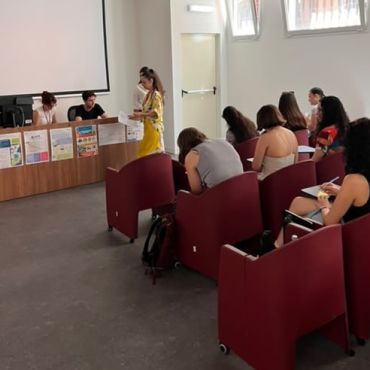
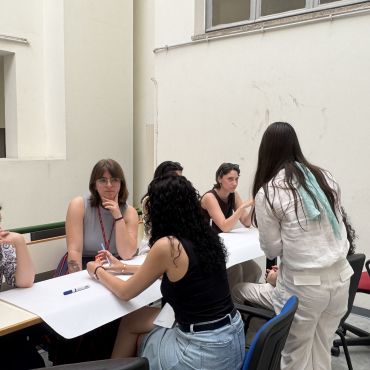
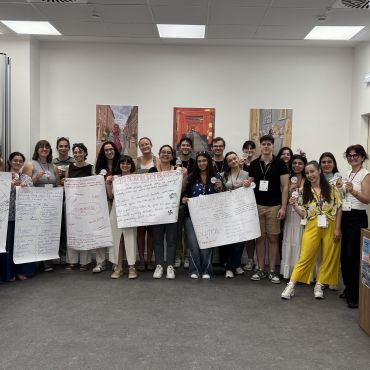
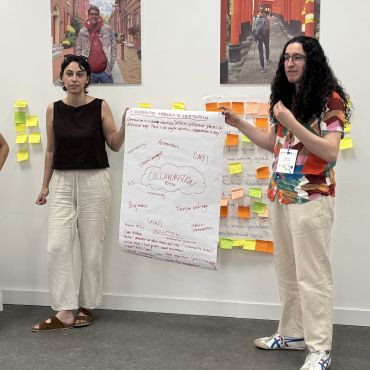
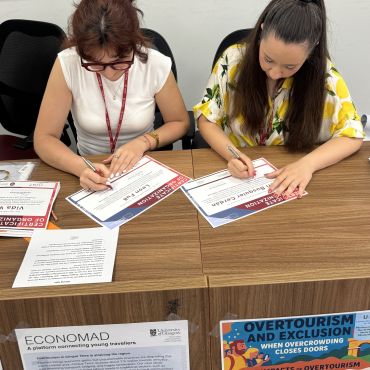
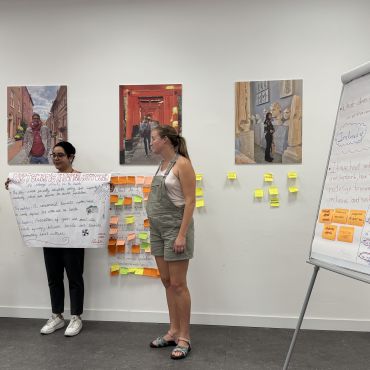
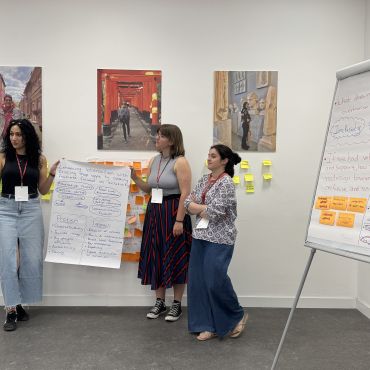
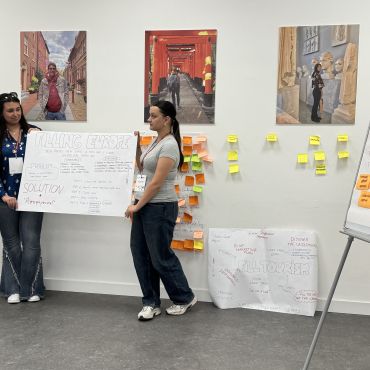
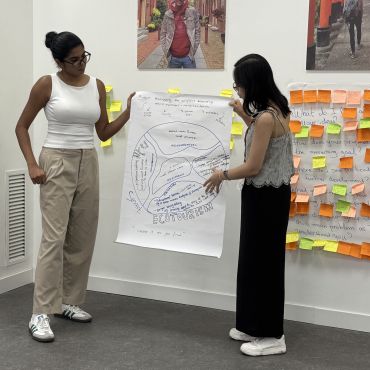
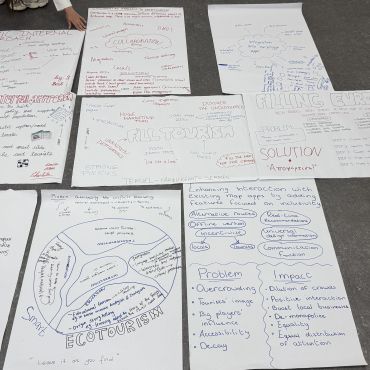
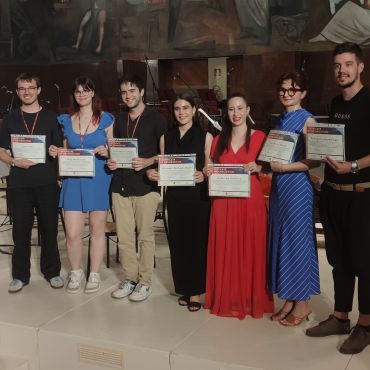
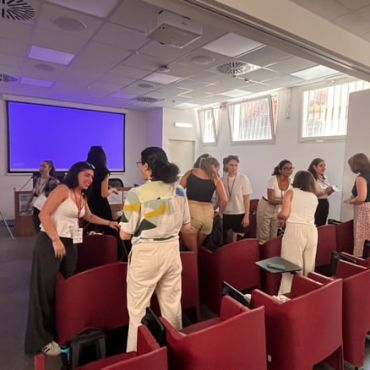
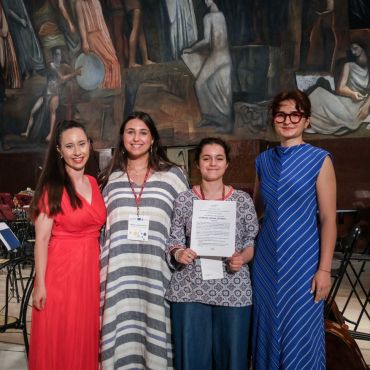
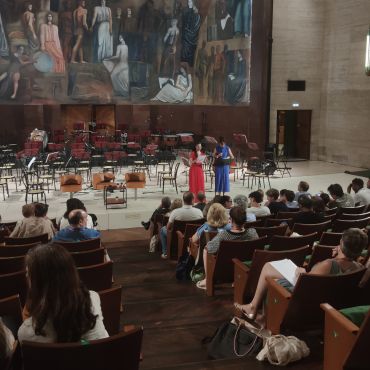
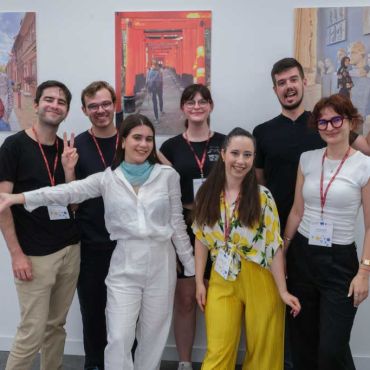
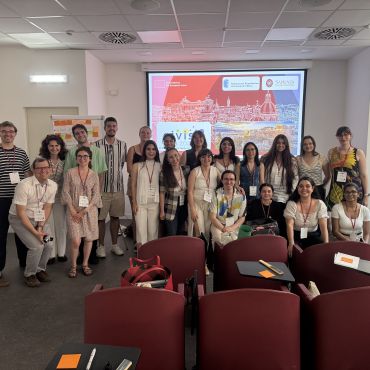
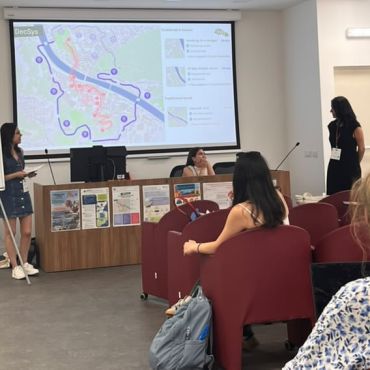
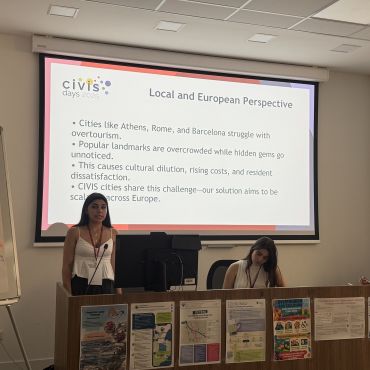
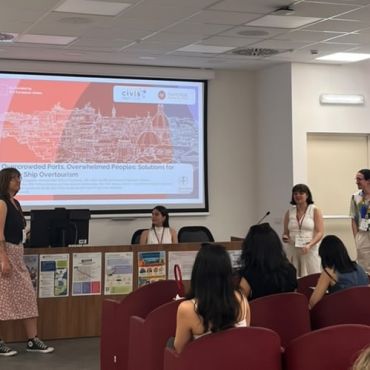
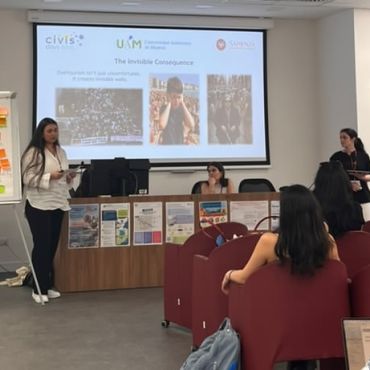
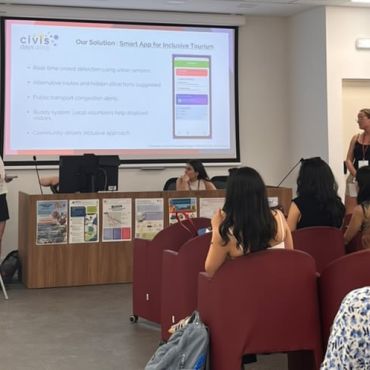
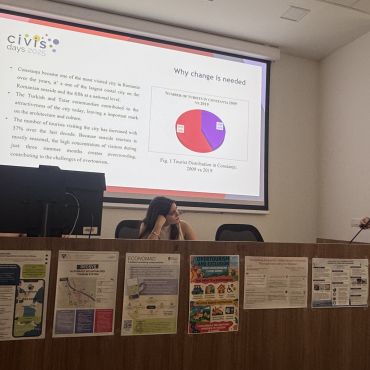
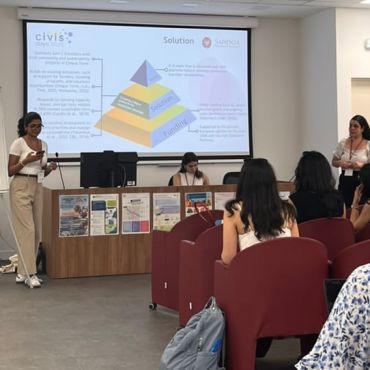
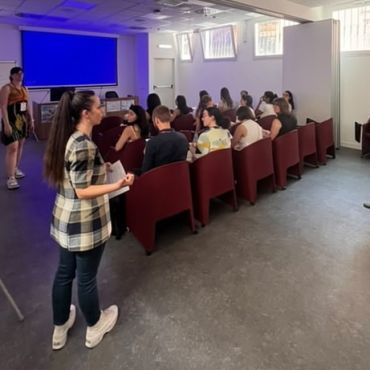
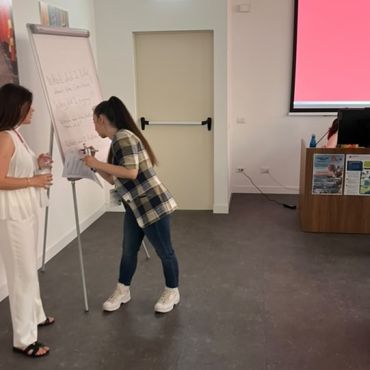
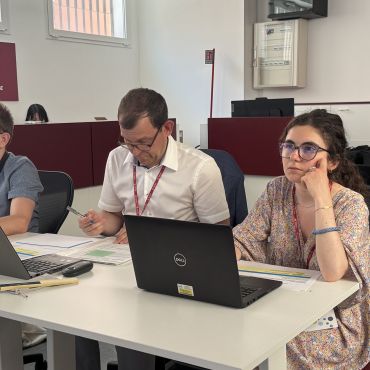
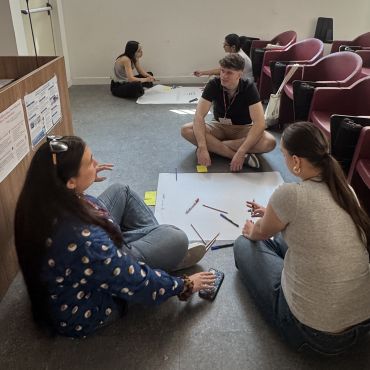
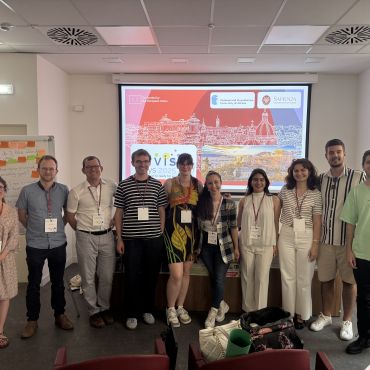
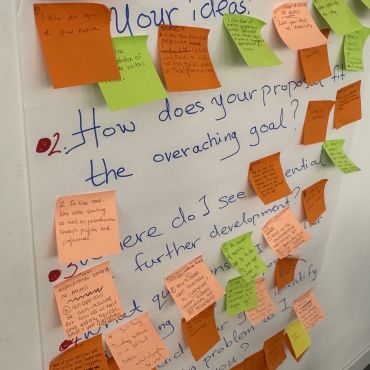
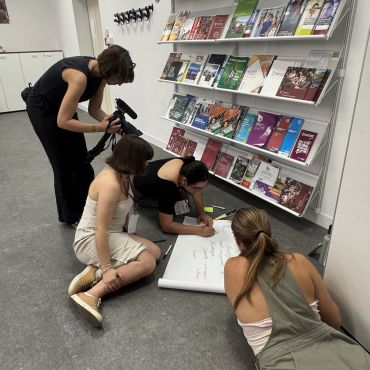


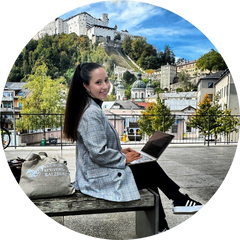 Katerina Schoina, National and Kapodistrian University of Athens
Katerina Schoina, National and Kapodistrian University of Athens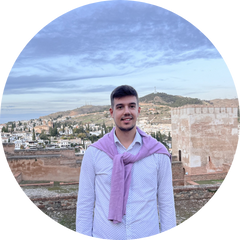
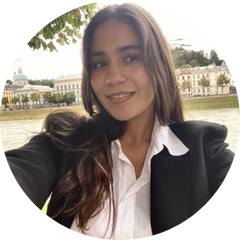
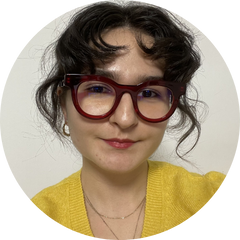
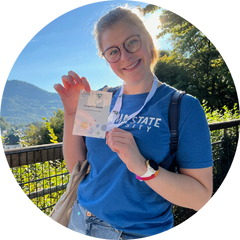 Vida Wåhlmark, Stockholm University
Vida Wåhlmark, Stockholm University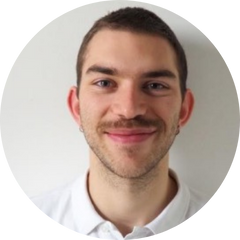 Dennis Siegel, University of Tübingen
Dennis Siegel, University of Tübingen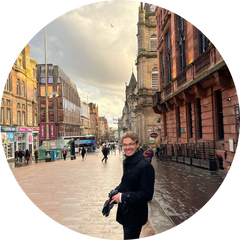 Leon Fuss, University of Tübingen
Leon Fuss, University of Tübingen